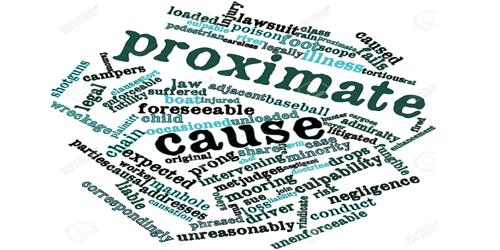“Proximate cause is not very essential in case of a life insurance contract –
Proximate cause is an act, whether intentional or negligent, that is determined to have caused someone else’s damages, injury, or suffering. It is important that courts establish proximate cause in personal injury cases because neither everyone nor everything that causes an injury can be held legally liable.
The doctrine of proximate cause is notoriously ion using. The doctrine is phrased in the language of causation, but in most of the cases in which proximate cause is actively litigated, there is not much dispute that the defendant but-for caused the plaintiffs injury. The doctrine is actually used by judges in a somewhat arbitrary fashion to limit the scope of the defendant’s liability to a subset of the total class of potential plaintiffs who may have suffered some harm from the defendant’s actions. For an understanding of the broader view of causation which proximate cause circumscribes, (E.X., butterfly effect).
For example, in the two famous Kinsman Transit cases from the 2nd Circuit (exercising admiralty jurisdiction over a New York incident), it was clear that mooring a boat improperly could lead to the risk of a boat drilling away and crashing into another boat, and that both boats could crash into a bridge, which collapsed and blocked the river, and in turn, the wreckage could flood the land adjacent to the river, as well as prevent any traffic from traversing the river until it had been cleared. But under a proximate cause, the property owners adjacent to the river could sue (Kinsman I), but not the owners of the boats or cargoes w the river was reopened (Kinsman II).
Therefore, in 2001, the American Law Institute proposed in a draft of the Restatement (Third), Torts: Liability for Physical Harm (Basic Principles) that proximate cause should be replaced with scope, of liability. It began with a special note explaining. the Institute’s decision to reframe the concept in terms of “scope of liability”‘ because it really doesn’t involve true causation, and to also include “proximate cause” in the chapter title in parentheses to help judges and lawyers, understand the connection between the old and new terminology. The Institute added that it “fervently hopes” that the parenthetical will not be needed in a future fourth Restatement of Torts.
















